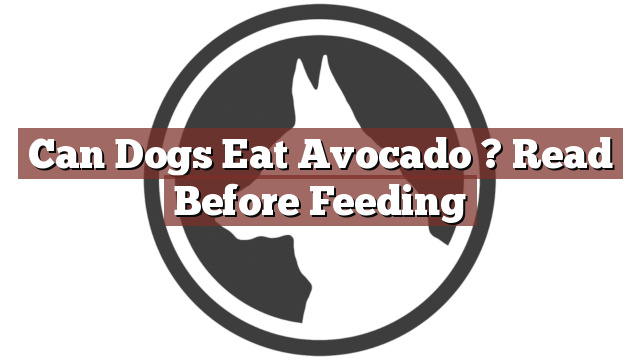Understanding Your Dog’s Dietary Needs
As responsible pet owners, it is crucial for us to understand our dog’s dietary needs. Providing them with a balanced and nutritious diet is essential for their overall health and well-being. While dogs primarily thrive on a diet that consists of high-quality dog food, it is natural for us to wonder if certain human foods can be given to them as well. One such food that often raises questions is avocado. So, can dogs eat avocado?
Can Dogs Eat Avocado? Read Before Feeding
Can dogs eat avocado? The answer is no. While avocado is a nutritious fruit for humans, it contains a substance called persin, which can be toxic to dogs. Persin is primarily found in the leaves, seed, and bark of the avocado tree, but it is also present in the fruit in small amounts. While the amount of persin in a ripe avocado is generally not harmful to humans, it can cause mild to severe health issues in dogs.
Avocado consumption can lead to symptoms such as vomiting, diarrhea, abdominal pain, and even pancreatitis in dogs. Additionally, the high fat content in avocados can cause stomach upset and potentially lead to more serious conditions such as pancreatitis. It is important to note that different dogs may react differently to avocado, and some may have more severe reactions than others.
Pros and Cons of Feeding Avocado to Dogs
While it is clear that avocado should be avoided in a dog’s diet, it is worth discussing the potential benefits that some claim avocados offer. Proponents argue that avocados contain healthy fats, vitamins, and minerals that can be beneficial for dogs. However, it is essential to remember that there are many other safe and appropriate sources of these nutrients for dogs. Feeding avocados to dogs may not be worth the potential risks and complications associated with persin toxicity.
In conclusion, it is best to err on the side of caution and avoid feeding avocados to your furry friend. There are plenty of other fruits and vegetables that are safe and nutritious for dogs, such as apples, carrots, and blueberries. Always consult with your veterinarian before introducing any new food into your dog’s diet to ensure their overall health and safety.
Conclusion: Tread Carefully When It Comes to Avocado and Your Dog
While avocados may be a beloved fruit for humans, they should be kept away from our canine companions. The presence of persin in avocados can lead to severe health issues in dogs, including gastrointestinal problems and pancreatitis. It is crucial for pet owners to prioritize their dog’s health and well-being by providing a well-balanced diet that consists of safe and appropriate foods. When in doubt, always consult with your veterinarian to ensure that you are making the best choices for your furry friend’s nutritional needs.
Thank you for taking the time to read through our exploration of [page_title]. As every dog lover knows, our furry friends have unique dietary needs and responses, often varying from one canine to another. This is why it's paramount to approach any changes in their diet with caution and knowledge.
Before introducing any new treats or making alterations to your dog's diet based on our insights, it's crucial to consult with a veterinarian about [page_title]. Their expertise ensures that the choices you make are well-suited to your particular pet's health and well-being.
Even seemingly harmless foods can sometimes lead to allergic reactions or digestive issues, which is why monitoring your dog after introducing any new food item is essential.
The content provided here on [page_title] is crafted with care, thorough research, and a genuine love for dogs. Nevertheless, it serves as a general guideline and should not be considered a substitute for professional veterinary advice.
Always prioritize the expert insights of your veterinarian, and remember that the health and happiness of your furry companion come first.
May your journey with your pet continue to be filled with joy, love, and safe culinary adventures. Happy reading, and even happier snacking for your canine friend!

